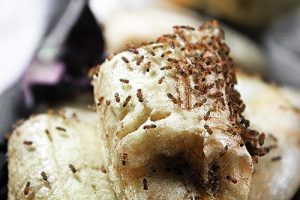It is expected that by 2050, the world’s population will have increased by one-third, with the highest increase occurring in developing countries; and with it, our needs for sustainable food and water as well. Nuclear technologies provide competitive and often unique solutions to help fight hunger and malnutrition, improve environmental sustainability and ensure that food is safe.
Radiosterilization eliminates bacteria from our food and extends their shelf life. It also improves the productivity of crops and offers an environmentally friendly alternative to pesticides. Finally, it brings solutions to the global problem of water shortages.1, 2
To meet the food needs of the world’s population in a satisfactory manner the FAO estimates that agricultural production will have to grow by 60% to satisfy the expected increased demands for food and feed. In order to support food security and alleviate poverty, it is necessary to adapt agricultural and food systems.
This is where nuclear technology comes in. It offers sustainable solutions that improve the production and thus the living conditions of growers and breeders, while preserving natural resources.

Figure 1 A mass of fruit flies crawling over a banana
The tiny fruit fly (a few millimeters) seem very innocent. Yet, they are responsible for billions of euros of damage to crops around the world. For it is by billions that they infest the fruit fields, feeding on the fruit pulp and developing there. This scourge depreciates the market value of fruits and renders them unfit for export, thus depleting entire regions.
Another problem is the use of pesticides to control these pests. $59 billion is spent annually on pesticides, and can affect the quality of food, public health and the environment. To protect crops against these insects, nuclear science has conducted extensive research for targeted, environmentally friendly biological control: The Sterile Insect Technique (SIT) was born. TIS is a kind of “birth control” of pests. It is based on mass breeding of male flies. These males are then sterilized by gamma radiation and released massively into the wild, where they can no longer reproduce. By repeating this operation over several generations, the fly population declines and eventually disappears. SIT has been successfully applied in combating the Mediterranean fruit fly, or medfly, which attacks over 250 species of fruit and vegetables. So great is the potential damage of medfly that countries free of it prohibit imports of fresh produce from countries where the pest is endemic.
 Biodiversity is essential on Earth. The search for new varieties of plants for culture and human consumption is simply called “plant selection”. Plant scientists can induce subtle changes or mutations in the genetic make up (DNA) in plant seeds, buds or tissue. By monitoring plant growth, they can identify and select strains with the desired characteristics and develop cultivars for direct use or further cross-breeding. This is the case of science imitating nature. Mutations occur naturally, though extremely rarely, due to factors such as mistakes in DNA replication. Thanks to the controlled use of ionising radiation, this natural diversity can be increased as much as 10,000-fold and the development of new varieties significantly accelerated. By irradiation, mutagenesis accelerates the natural process of spontaneous mutation of plants and creates useful characteristics that are not encountered in nature or that have disappeared during evolution.
Biodiversity is essential on Earth. The search for new varieties of plants for culture and human consumption is simply called “plant selection”. Plant scientists can induce subtle changes or mutations in the genetic make up (DNA) in plant seeds, buds or tissue. By monitoring plant growth, they can identify and select strains with the desired characteristics and develop cultivars for direct use or further cross-breeding. This is the case of science imitating nature. Mutations occur naturally, though extremely rarely, due to factors such as mistakes in DNA replication. Thanks to the controlled use of ionising radiation, this natural diversity can be increased as much as 10,000-fold and the development of new varieties significantly accelerated. By irradiation, mutagenesis accelerates the natural process of spontaneous mutation of plants and creates useful characteristics that are not encountered in nature or that have disappeared during evolution.
In this context, nuclear technology induces a genetic mutation (mutagenesis) to develop plants that are better adapted to their environmental and climatic conditions.
In the face of climate change, it is more than ever necessary to rationalise resources for agriculture, such as soils, water and fertilizers. Techniques using radiotracers can be applied to measuring and controlling soil water content and nutrients.
Soil nutrients and water are essential to plant growth, but in many areas of the developing world soils are deficient in key nutrients. Sustainable agriculture depends on maintaining a balance between consuming and conserving soil nutrients and water resources. Stable and radioactive isotopes can play a crucial role in understanding soil-plant interactions and in helping to increase crop production through better soil management.3





References
1 IAEA. (2019). Vietnam enhance food quality using irradiation. https://www.iaea.org/newscenter/news/viet-nam-enhances-food-quality-using-irradiation
2 IAEA https://www.iaea.org/about/overview/sustainable-development-goals/goal-2-zero-hunger
3 IAEA. (2019). Food and Agriculture. https://www.iaea.org/topics/food-and-agriculture